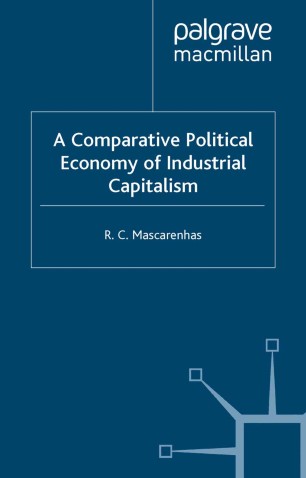
A Comparative Political Economy of Industrial Capitalism
Authors
(view affiliations)
R. C. Mascarenhas
Book
Buy eBook
USD 59.99
Table of contents (11 chapters)
About this book
Introduction
This comparative study of industrial capitalism is an examination of state-economy relations in mixed economies ranging from the interventionist German and Japanese to the less interventionist Anglo-American. Following the postwar consensus that resulted in the 'golden age' (1950-1973) and ended with the energy crisis, the Anglo-American economies adopted neoliberalism while Germany and Japan remained interventionist. This resulted in the emergence of national types of capitalism. While analyzing the increased competition between them, R.C.Mascarenhas also notes the influence of globalization as well as 'alternative capitalism' with the survival and re-emergence of industrial districts.
Keywords
competitioneconomyGermanyglobalizationInstitutioninterventionneoliberalismpolitical economy
Authors and affiliations
R. C. Mascarenhas
Department of Political Science
competitioneconomyGermanyglobalizationInstitutioninterventionneoliberalismpolitical economy
Authors and affiliations
R. C. Mascarenhas
Department of Political Science
University of Melbourne Australia
DOIhttps://doi.org/10.1057/9780230597808
Copyright InformationPalgrave Macmillan, a division of Macmillan Publishers Limited 2002
Publisher NamePalgrave Macmillan, London
Introduction
R. C. Mascarenhas
Pages 1-5
Historical, Institutional and Philosophical Foundations of Capitalism
Front Matter
Pages 7-7
Comparative Political Economy: An Institutionalist Approach
R. C. Mascarenhas
Pages 9-29
Developments in Modern Industrial Capitalism
R. C. Mascarenhas
Pages 30-44
State and the Economy
R. C. Mascarenhas
Pages 45-63
Recent Developments and Changes in Industrial Organization
Front Matter
Pages 65-65
Changing Nature of Capitalism: Large-Scale Enterprises
R. C. Mascarenhas
Pages 67-95
Globalization and Its Effects on Capitalism
R. C. Mascarenhas
Pages 96-112
Alternative Models of Capitalism
R. C. Mascarenhas
Pages 113-132
Comparative Studies of Modern Capitalism
Front Matter
Pages 133-133
Types of Capitalism: Anglo-American
R. C. Mascarenhas
Pages 135-166
German Capitalism: The Social Market Model
R. C. Mascarenhas
Pages 167-198
Japan: The East Asian Developmental State
R. C. Mascarenhas
Pages 199-225
Comparative Perspective of Industrial Capitalism
R. C. Mascarenhas
Pages 226-233
DOIhttps://doi.org/10.1057/9780230597808
Copyright InformationPalgrave Macmillan, a division of Macmillan Publishers Limited 2002
Publisher NamePalgrave Macmillan, London
Introduction
R. C. Mascarenhas
Pages 1-5
Historical, Institutional and Philosophical Foundations of Capitalism
Front Matter
Pages 7-7
Comparative Political Economy: An Institutionalist Approach
R. C. Mascarenhas
Pages 9-29
Developments in Modern Industrial Capitalism
R. C. Mascarenhas
Pages 30-44
State and the Economy
R. C. Mascarenhas
Pages 45-63
Recent Developments and Changes in Industrial Organization
Front Matter
Pages 65-65
Changing Nature of Capitalism: Large-Scale Enterprises
R. C. Mascarenhas
Pages 67-95
Globalization and Its Effects on Capitalism
R. C. Mascarenhas
Pages 96-112
Alternative Models of Capitalism
R. C. Mascarenhas
Pages 113-132
Comparative Studies of Modern Capitalism
Front Matter
Pages 133-133
Types of Capitalism: Anglo-American
R. C. Mascarenhas
Pages 135-166
German Capitalism: The Social Market Model
R. C. Mascarenhas
Pages 167-198
Japan: The East Asian Developmental State
R. C. Mascarenhas
Pages 199-225
Comparative Perspective of Industrial Capitalism
R. C. Mascarenhas
Pages 226-233


